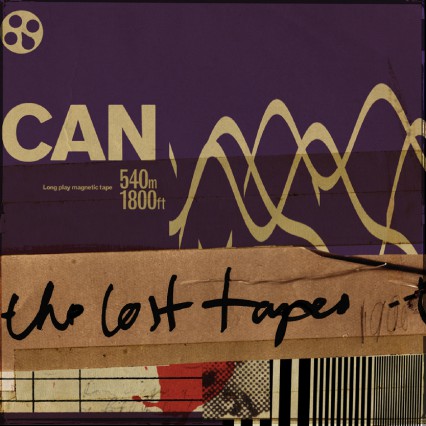Jim Morphy mulls over a new 3CD boxset from German experimental rock pioneers Can in his review of their The Lost Tapes.
Can’s keyboard player Irmin Schmidt says The Lost Tapes isn’t like the band’s albums, ‘which were always aiming at the masterpiece’. Rather, this 3CD box-set ‘is just more the process of doing, showing how pieces were developed, about the atmosphere of creating’.
And, without doubt, this collection of previously-unreleased studio jams, works-in-progress, film soundtracks and live material is a godsend for those wanting to look under the bonnet of Can – surely one of the most innovative and influential rock bands of the last 50 years.
However, it would be wrong to dismiss The Lost Tapes simply as a curiosity for Krautrock obsessives. For the very nature of Can’s modus operandi – mammoth rehearsal sessions, improvisation, reworking old pieces, splicing fragments together – means a sprawling box-set gives an ideal picture of the band. This is Can. And whatever the intention when these efforts were recorded, what we get is most certainly a work of bona-fide genius, with masterpieces within.
Can formed 44 years ago in Cologne, West Germany. A group made up of classical music students, a free jazz drummer, and changing, but always eccentric, improvising vocalists, Can were, to quote Sonic Youth’s Thurston Moore, a rock group coming from a place completely outside of rock. Their immense importance to modern popular music is beyond question.

Can
Spoon / Mute
Listing bands influenced by them – such as Radiohead, The Fall and, er, Kasabian – seems somewhat inadequate. Better to name entire genres that owe something to their sound: post-rock, electronica, ambient and post-punk, for a few.
During their ‘spontaneous composition’ studio sessions, Can taped everything, believing inspiration could come at any point. Dross would get recorded over. Some music would get picked up for whatever record was being made at the time. Other tracks and fragments would get filed away, saved for possible future use.
The 50 hours of music spanning 1968 to 1977 hoarded away in studio cupboards was the starting point for The Lost Tapes. Schmidt found three hours he deemed worthy of releasing to the world (the remaining 47 becoming the new Holy Grail).
Standout tracks are everywhere. The 17-minute ‘Graublau‘, originally created for a film, serves as a grand tour of the last 50 years of alternative music, taking in contemporaries Faust, stopping by PiL, and even The Avalanches, and ending up somewhere in the vicinity of Kieran Hebdan.
‘Millionenspiel’ is a sharp, urgent track that kicks off the whole affair. The stunning ‘Bubble Rap’ is a scuzzy, throbbing beast of a tune, with busker-turned-singing-legend Damo Suzuki leading from the front. The beautiful ‘Oscura Primavera’ reminds us that sometimes Can ‘were just plain nice’, if only ‘for obscure reasons’, as Schmidt says. It brings Mogwai doing their quiet thing to mind.
‘Dead Pigeon Suite’ brings together more soundtrack work in an ingeniously cut together piece – part electronica, part fairytale, part funk. ‘Deadly Doris’ is an uptempo gem – the type to get even ATP shoegazers jumping. ‘Messer, Scissors, Fork and Light’ is, simply, a colossus.
The fast and loose ‘Waiting For The Streetcar’ is perhaps the litmus test of the album: enjoy eight minutes of Malcolm Mooney’s non-stop chanting of the title phrase and you can count yourself a true Can-head. Disapprove, and you might as well wander off elsewhere – Heart FM, perhaps.
Thrown in for good measure, we get interpretations of established classics ‘Mother Sky’, ‘Spoon’ and ‘Mushroom’. The first is based around a fragment we know from the version on the Soundtracks record (indeed, a joy of this box-set is in hearing snippets we half-recognise from album tracks). We get lengthy and meandering concert recordings of the second and third, showcasing the band’s skills for live improvisation.
The range of Can’s influences and kindred spirits is hugely apparent, often within the same song. The band members’ knowledge of classical music, jazz and African drumming rhythms shines through. Other times, we’re not too far from The Velvet Underground, Hendrix, Zappa, or James Brown.
No doubt, many will find much of this box-set wilfully self-indulgent, most likely during songs such as ‘The Agreement’, ‘Blind Mirror Surf’ and ‘True Story’. But even in that work we see a template for what is today being passed off as cutting edge noise-art. Some of the more intensive excursions into prog-rock will also not be to everyone’s tastes.
Serious plaudits must go to Schmidt and his son-in-law, sound engineer, Jono Podmore, for bringing these disparate fragments together into a coherent record. This is a box-set that not only does justice to the brilliance of Can, but that shows that Can got pretty much everywhere first. It is a truly staggering release. Enjoy, and behold.










